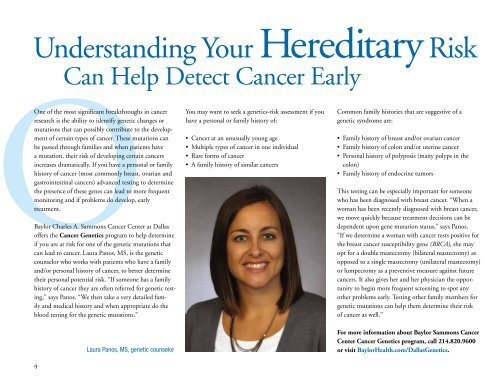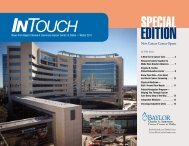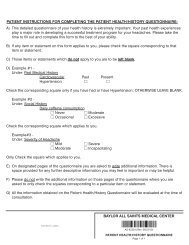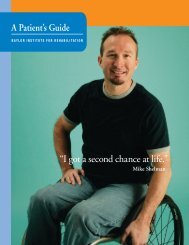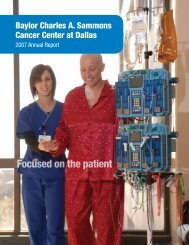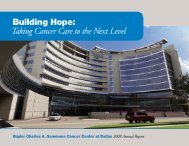Fall 2011 - Baylor Health Care System
Fall 2011 - Baylor Health Care System
Fall 2011 - Baylor Health Care System
You also want an ePaper? Increase the reach of your titles
YUMPU automatically turns print PDFs into web optimized ePapers that Google loves.
Understanding Your Hereditary Risk<br />
Can Help Detect Cancer Early<br />
One of the most significant breakthroughs in cancer<br />
research is the ability to identify genetic changes or<br />
mutations that can possibly contribute to the development<br />
of certain types of cancer. These mutations can<br />
be passed through families and when patients have<br />
a mutation, their risk of developing certain cancers<br />
increases dramatically. If you have a personal or family<br />
history of cancer (most commonly breast, ovarian and<br />
gastrointestinal cancers) advanced testing to determine<br />
the presence of these genes can lead to more frequent<br />
monitoring and if problems do develop, early<br />
treatment.<br />
<strong>Baylor</strong> Charles A. Sammons Cancer Center at Dallas<br />
offers the Cancer Genetics program to help determine<br />
if you are at risk for one of the genetic mutations that<br />
can lead to cancer. Laura Panos, MS, is the genetic<br />
counselor who works with patients who have a family<br />
and/or personal history of cancer, to better determine<br />
their personal potential risk. “If someone has a family<br />
history of cancer they are often referred for genetic testing,”<br />
says Panos. “We then take a very detailed family<br />
and medical history and when appropriate do the<br />
blood testing for the genetic mutations.”<br />
You may want to seek a genetics-risk assessment if you<br />
have a personal or family history of:<br />
• Cancer at an unusually young age<br />
• Multiple types of cancer in one individual<br />
• Rare forms of cancer<br />
• A family history of similar cancers<br />
Common family histories that are suggestive of a<br />
genetic syndrome are:<br />
• Family history of breast and/or ovarian cancer<br />
• Family history of colon and/or uterine cancer<br />
• Personal history of polyposis (many polyps in the<br />
colon)<br />
• Family history of endocrine tumors<br />
This testing can be especially important for someone<br />
who has been diagnosed with breast cancer. “When a<br />
woman has been recently diagnosed with breast cancer,<br />
we move quickly because treatment decisions can be<br />
dependent upon gene mutation status,” says Panos.<br />
“If we determine a woman with cancer tests positive for<br />
the breast cancer susceptibility gene (BRCA), she may<br />
opt for a double mastectomy (bilateral mastectomy) as<br />
opposed to a single mastectomy (unilateral mastectomy)<br />
or lumpectomy as a preventive measure against future<br />
cancers. It also gives her and her physician the opportunity<br />
to begin more frequent screening to spot any<br />
other problems early. Testing other family members for<br />
genetic mutations can help them determine their risk<br />
of cancer as well.”<br />
R<br />
Laura Panos, MS, genetic counselor<br />
For more information about <strong>Baylor</strong> Sammons Cancer<br />
Center Cancer Genetics program, call 214.820.9600<br />
or visit <strong>Baylor</strong><strong>Health</strong>.com/DallasGenetics.<br />
4


